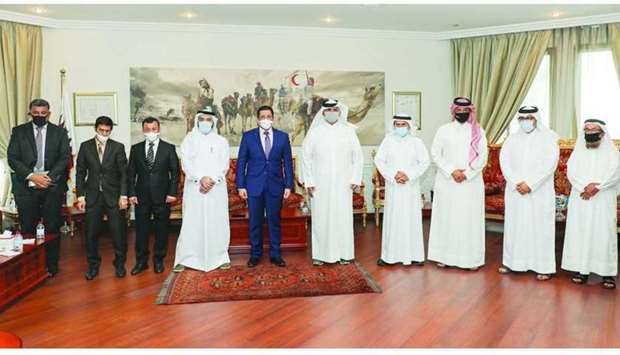Sheikh Abdullah bin Thamer al-Thani, president of Qatar Red Crescent Society (QRCS), yesterday met with Ahmed Awad bin Mubarak, Yemen’s Minister of Foreign Affairs and Expatriates, who headed a delegation to discuss the humanitarian situation in Yemen.

The meeting was attended by Ali bin Hassan al-Hammadi, secretary-general; Ibrahim Abdullah al-Malki, CEO; Faisal Mohamed al-Emadi, executive director of the Relief and International Development Division; Mohamed Rashid al-Marri, director of Communication and Public Relations; Dr Fawzi Oussedik, head of International Relations and International Humanitarian Law; and Adel al-Baker, director of the QRCS president's office.
The visitors thanked QRCS for their hospitality and commended the great humanitarian contributions by Qatar in order to alleviate the
suffering of the Yemenis affected by the many years of conflict in their country.
Mubarak talked about the efforts of his government to improve the living conditions of the population, despite the massive challenges out there. He wished that the conflict would come to an end very soon.
He thanked Qatar for all the many forms of aid given by its humanitarian and government organisations to Yemen.
The minister emphasised the importance of focusing on developmental projects that help people to work and earn their living. There are plans to work on a set of economic incentives, amid a worsening Covid-19 outbreak, demographic changes caused by mass displacement and the pressure on services in the destinations of internally displaced persons (IDPs).
Sheikh Abdullah promised to be there for Yemenis in every possible way. “Currently, we have 19 health and humanitarian projects in many governorates of Yemen,” he said. “We work through our representative offices there, in co-operation with many UN agencies, such as UNHCR, OCHA and UNDP."
The QRCS president said they were totally open to co-operation and communication with the competent authorities in Yemen, looking
forward to facilities from the minister to accelerate the work of field personnel in the face of humanitarian difficulties.
An overview was given on QRCS’s ongoing operations across the country, especially the most vulnerable governorates such as
Taiz, Sanaa, Al-Hudaydah, Dhale, Sa'dah, Hajjah, Shabwah, Raymah, 'Amran, Al-Jawf and Dhamar.
These address the health, water, sanitation, shelter and food security sectors, under co-operation agreements with Yemen Red
Crescent Society and the Ministry of Planning and International Co-operation of Yemen.

Sheikh Abdullah bin Thamer al-Thani with Ahmed Awad bin Mubarak during their meeting
The meeting was attended by Ali bin Hassan al-Hammadi, secretary-general; Ibrahim Abdullah al-Malki, CEO; Faisal Mohamed al-Emadi, executive director of the Relief and International Development Division; Mohamed Rashid al-Marri, director of Communication and Public Relations; Dr Fawzi Oussedik, head of International Relations and International Humanitarian Law; and Adel al-Baker, director of the QRCS president's office.
The visitors thanked QRCS for their hospitality and commended the great humanitarian contributions by Qatar in order to alleviate the
suffering of the Yemenis affected by the many years of conflict in their country.
Mubarak talked about the efforts of his government to improve the living conditions of the population, despite the massive challenges out there. He wished that the conflict would come to an end very soon.
He thanked Qatar for all the many forms of aid given by its humanitarian and government organisations to Yemen.
The minister emphasised the importance of focusing on developmental projects that help people to work and earn their living. There are plans to work on a set of economic incentives, amid a worsening Covid-19 outbreak, demographic changes caused by mass displacement and the pressure on services in the destinations of internally displaced persons (IDPs).
Sheikh Abdullah promised to be there for Yemenis in every possible way. “Currently, we have 19 health and humanitarian projects in many governorates of Yemen,” he said. “We work through our representative offices there, in co-operation with many UN agencies, such as UNHCR, OCHA and UNDP."
The QRCS president said they were totally open to co-operation and communication with the competent authorities in Yemen, looking
forward to facilities from the minister to accelerate the work of field personnel in the face of humanitarian difficulties.
An overview was given on QRCS’s ongoing operations across the country, especially the most vulnerable governorates such as
Taiz, Sanaa, Al-Hudaydah, Dhale, Sa'dah, Hajjah, Shabwah, Raymah, 'Amran, Al-Jawf and Dhamar.
These address the health, water, sanitation, shelter and food security sectors, under co-operation agreements with Yemen Red
Crescent Society and the Ministry of Planning and International Co-operation of Yemen.

